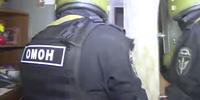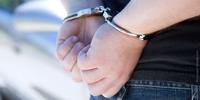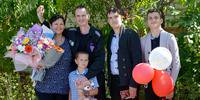The Case of Beltikov in Pavlovskaya
Filter
- #
As part of the criminal case against Lyudmila Shchekoldina , a search of the home and interrogation of Maxim Beltikov are being conducted.
- #
Lieutenant of Justice M. Loy, investigator of the 2nd branch of the Krasnodar Territory Directorate of the FSB of Russia, initiates a criminal case against Maxim Beltikov under Part 2 of Article 282. 2 of the Criminal Code of the Russian Federation (participation in the activities of a banned extremist organization).
In the decision to institute criminal proceedings, the investigator uses the following wording: "participated in religious teaching and sermons, during which ... conducted and listened to lectures based on religious literature, entered into conversations and religious discussions, participated in collective discussions of the content of religious books."
- #
Beltikov is brought in as an accused, he is interrogated. Investigator M. Loi asks the believer about his religious beliefs and belonging to a legal entity banned by the court, the local religious organization Jehovah's Witnesses of the village of Pavlovskaya.
Beltikov is chosen a measure of restraint in the form of a written undertaking not to leave and proper behavior.
- #
The defense submits a motion to the investigator to dismiss the criminal case on the basis of the opinion of the UN Working Group on Arbitrary Detention.
- #
- #
The case goes to the Pavlovsky District Court of the Krasnodar Territory. It is being considered by judge Andriy Mynochka.
- #
15 people come to support the believer. They continue to stay outside the courthouse, despite the cold weather and darkness.
The prosecutor reads out the indictment. The defendant declares that he does not understand the essence of the charge, and wants to express his attitude to the charge. The judge refuses.
A witness is being questioned. He confirms that the defendant read the Bible along with other believers at the services of Jehovah's Witnesses. There were no statements about the superiority of his religion over other faiths from Beltikov.
- #
During the court hearings, one of the prosecution witnesses is questioned. He tells the court that he has known the Beltikov family for 15 years and only from the good side.
The lawyer petitions to listen to the audio recording of the conversation between the defendant and the main witness for the prosecution Ilchenko. Beltikov claims that in the transcript of the audio recording, the words spoken by Ilchenko are attributed to him. These statements are imputed to the defendant.
- #
Audio recordings of the conversation between Beltikov and Ilchenko are listened to.
The defense draws attention to distortions in the transcript of the audio recording and phonoscopic examination.
- #
Prosecution witness V. V. Ilchenko is being questioned. He confirms that the words attributed to the defendant are in fact his own.
Other witnesses interrogated say they have known Beltikov for about 20 years. They confirm that they have never heard him call for violence.
- #
The court rejects the defense's request to exclude the phonoscopic examination. However, the judge partially grants the defense's request to interrogate the experts via video link.
- #
Judge Mynochka interrogates experts: a religious scholar and a psychologist. They confirm that they did the examination on the basis of a transcript, not an audio recording.
The defense shall file a motion for a second phonoscopic examination.
- #
V. V. Ilchenko is being interrogated. He admits that the negative remarks about adherents of other religions actually belong to him, and not to Beltikov.
- #
The court rejects the defense's petition for the appointment of a phonoscopic examination.
- #
The court rejects the defense's motion to exclude the transcript from the case file.
- #
Judge Mynochka rejects the defense's petition for the appointment of a repeated comprehensive phonoscopic examination.
The judge refuses to satisfy the defense's request for photo and video filming due to a threat to the safety of the court and the participants in the process.
- #
Maksim Beltikov appeals to the court. He says, "My religious views are based on the Bible. They are expressed in two basic commandments: love of God and love of people. Therefore, my views are directly opposite to what is called extremism. The materials of the criminal case do not prove the opposite. [...] I continue to practice my peaceful religion as one of Jehovah's Witnesses. But I have never given up on it and I will not give it up."
He also draws attention to the fact that Russian President Vladimir Putin said that the Bible cannot be recognized as extremist material. In addition, he emphasizes that the norms of international law are an integral part of the legal system of the Russian Federation and guarantee the right to freedom of religion to all, including Jehovah's Witnesses.
- #
During the debate, the prosecutor asks the court to find Maksim Beltikov guilty and sentence him to 3 years in prison in a penal colony.
- #
The last word of the defendant Maxim Beltikov in the village of Pavlovskaya - #
The court hearing is postponed to January 17.
- #
Judge of the Pavlovskiy District Court of the Krasnodar Territory Andrey Mynochka finds Maksim Beltikov guilty of participating in the activities of an extremist organization and sentences him to 2 years in a general regime colony with restriction of liberty for 1 year. The believer is taken into custody in the courtroom.
- #
It becomes known that Maxim Beltikov is in pre-trial detention center No. 1 in the city of Krasnodar.
- #
It becomes known that Maksim Beltikov was transferred from pre-trial detention center No. 1 in Krasnodar to a correctional colony in the city of Khadyzhensk. He can send letters by regular mail.
- #
The lawyer visits Maksim Beltikov in the colony. He is being held in a 4-bed cell with two other prisoners. Maksim's relations with his cellmates and the administration of the colony are friendly.
Upon arrival at the correctional facility, Beltikov sought medical help in connection with a gastrointestinal disease and high blood pressure. Now he receives part of the necessary medicines, the rest of the prescription drugs his wife will give him in the near future. He maintains a positive attitude.
During the three weeks of his stay in the colony, Beltikov received more than 800 letters, 200 of which have already been handed over to him.
- #
Maksim was visited by a public defender in the colony. The believer does not complain about his health, but he is worried about his gradually weakening eyesight, and there is no way to invite an ophthalmologist to the colony. But Maxim is not discouraged, he is supported by letters from fellow believers, which he still receives in large quantities. He is also pleased that he is treated well in the colony.
According to the public defender, the case of Maksim Beltikov has already been transferred to the Krasnodar Regional Court for appeal.
- #
Session in the Court of Appeal. 16 people come to support the family of Maksim Beltikov, some of them have traveled hundreds of kilometers. The believer's wife, Maria, and a lawyer are allowed into the courtroom. Beltikov himself attended via videoconference. Due to communication problems, the meeting is postponed to September 19. Due to communication problems, the meeting is postponed to September 19.
- #
- #
It becomes known that the court imposed 3 years of administrative supervision on the believer after serving the sentence of restriction of freedom. Thus, after serving the main sentence, the additional restriction of liberty will be 4 years.
- #




